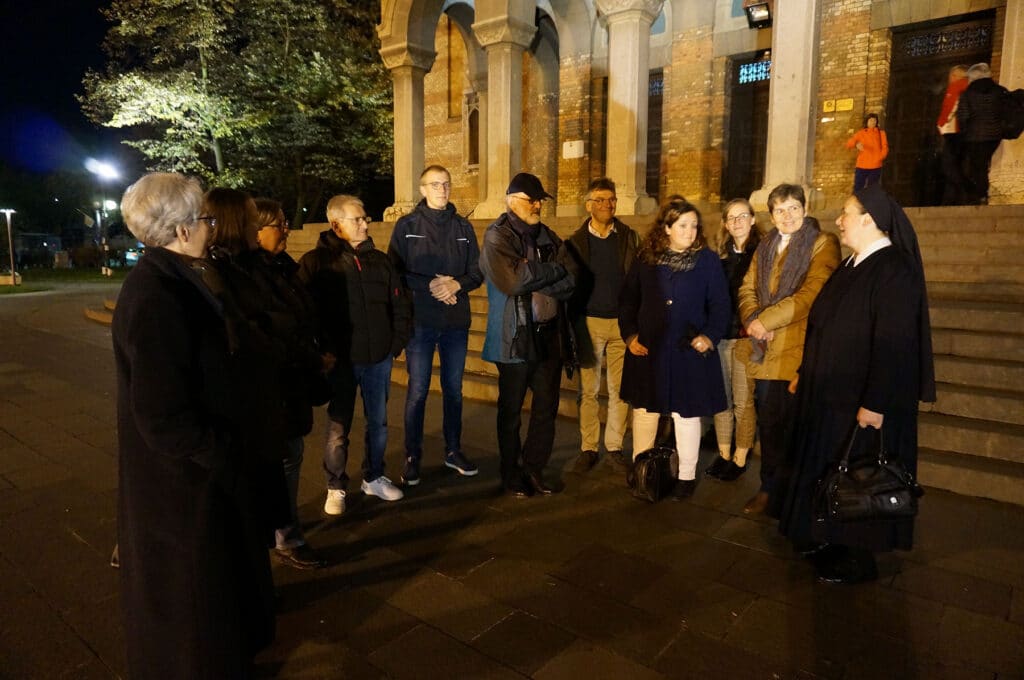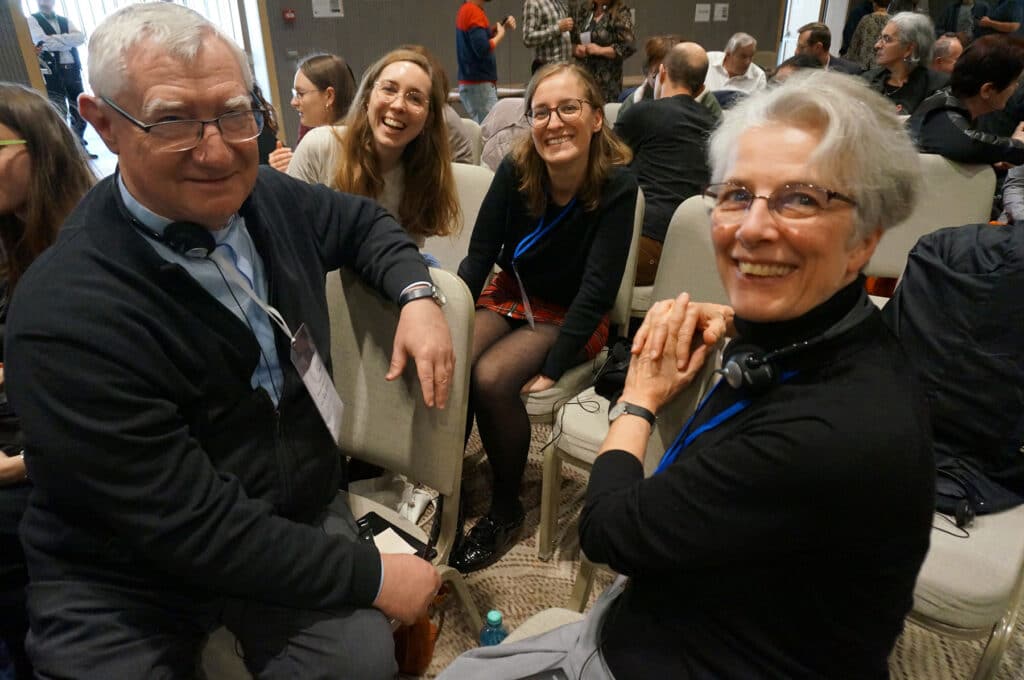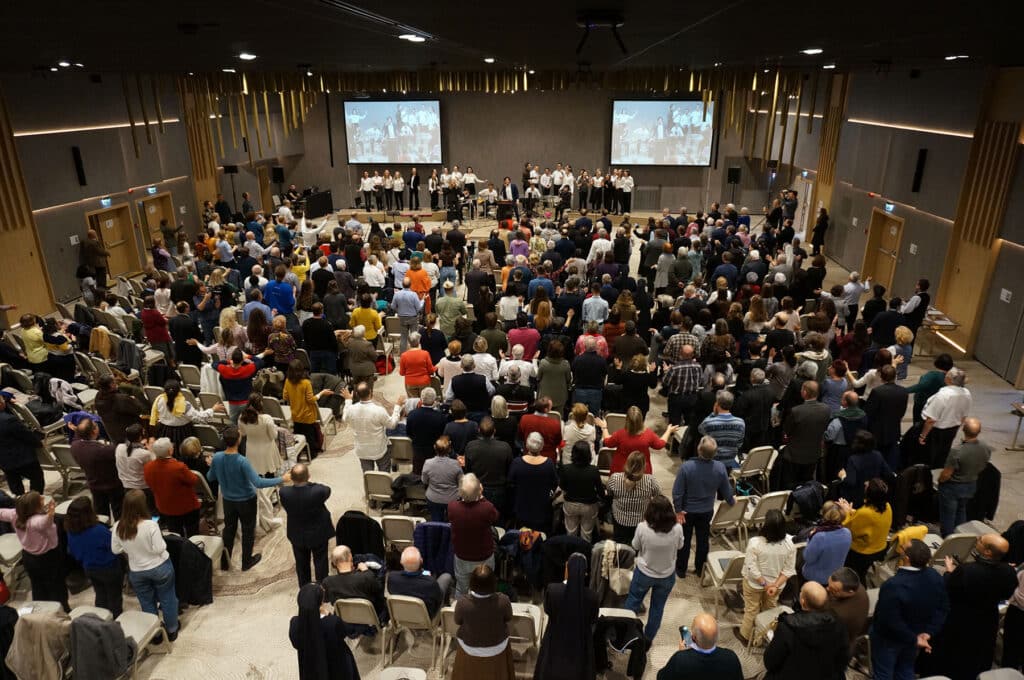From November 16-18, more than 20 members of the Schoenstatt Movement from various European countries were among the 220 participants of the group “Together for Europe”, gathered for their annual meeting. The meeting took place in the European Capital of Culture, Timisoara, Romania. Those present experienced a “Church on the go”, as Elisabeth Hagmann of the German Schoenstatt Family Federation described it, as well as an enriching unity in diversity.
Tilman Müller, a theology student and member of the German Schoenstatt Boys’ Youth, said: “For me it was very enriching to witness at the meeting in Timisoara how unity in diversity can be fruitful. Throughout the days, among all the Christians of the different denominations, I could experience how rewarding the exchange among them is and that this is possible in absolute peace with one another.”
Compelling experience of unity
Father Ludwig Güthlein, director of the Schoenstatt Movement in Germany, also emphasized: ” On a small scale, Europe was a key notion with regard to the successful coexistence of denominations and ethnic groups. Diversity lived in unity is an experience that has taken place in Timisoara over many years of history.” It is “an inspiration” for cooperation in the ecumenical network Together for Europe.

Rebekka Bischoff, a founding member of the German “Youth for the Church” network, who was attending a European meeting of Together for Europe for the first time, was also impressed by the experience of unity in diversity. “In the evening, we Schoenstatt youth went to a bar with a Romanian woman, and the next day we had lunch with two Ukrainian women, who received a gift from the Russian participants, which really touched me. So many countries (29 this time) and so many different groups (50 in total) from the Catholic, Protestant, Free and Orthodox Churches have come together, and it is possible to pray together.”
Night of the Shrine was present: the manner is secondary
Johanna Denkinger, a member of the Schoenstatt Girls’ Youth and member of the core team of the youth festival Night of the Shrine, also emphasized the unity: “I had never experienced it like this, but I realized that if everyone really loves Jesus, the manner is secondary – then you have more than enough in common.”
For Tilman Müller, this “unity in Christ was felt most profoundly in prayer.” This “openness to the diversity of Christianity,” Müller continued, not only gave him the opportunity to “continue to share the spirit of Schoenstatt,” but was also a challenge for him and a mission to “bring back to Schoenstatt the fruitfulness of this diversity and thus turn it into a source of enrichment for our Movement.”

Schoenstatt in the International Support Group of Together for Europe
As a member of the coordination team of the International Support Group of Together for Europe, and thus co-responsible for the organization of the days in Timisoara, Sister M. Lioba Ruprecht also emphasized the unity around the key word, which was initially experienced as hospitality. “Hospitality – the Catholic bishop of the city was the one who extended the invitation. He was always among the first in the room; he approached everyone and expressed final words that were on target: the meeting gave him hope that unity is possible.” Bishop Josef-Csaba Pál adopted a realistic point of view: “Relationships are hard work, but they are the only way to work together,” Sister Lioba said.
Christians must take a responsible interest in politics
The Schoenstatt Sister of Mary, who is part of the international leadership of her community, remarked on the inspiration gained from Timisoara through the significant contribution of Eduard Heger, former Prime Minister of Slovakia. “Do not leave politicians out in the cold. They need your wisdom, your closeness, your encouragement.” These words from a politician who, by his own admission, has believed in Jesus Christ for 22 years and leads a charismatic community in Bratislava, triggered in me the question: what can I actually do?” Heger made it clear to what extent Christian politicians depend on the living faith of Christians and how important it is for Christians in particular “to build relationships with those who have responsibilities in our society,” concluded Sister Lioba.

Father Güthlein also emphasized this when he said, “The extent to which the Slovak Prime Minister, who has been voted out of office, has campaigned for the involvement of Christians in the political sphere, is something that resonates with me. Christians, in particular, must take a shared interest in politics. We should not underestimate the efforts of Christian-motivated politicians.”
Sister M. Ilga Dreyer, Provincial Superior in Liebfrauenhöhe and responsible for the branch office of the Schoenstatt Sisters of Mary in Timisoara, told about an encounter with a married couple during the Together for Europe journey: “she was a religious education teacher, a Protestant until recently; he, a Catholic, was an elementary school principal until last year” and regarding the question in the conference program “whether politicians should become more involved when dealing with the future of Europe”, the “”impactful and moving contribution of Eduard Heger the following day” was an eloquent reply to this debate, said Sister M. Ilga.
Reconciliation: not vindictiveness and reaching out to one another
This ties in with another topic that Sister M. Lioba takes away from this gathering in Timisoara: “Reconciliation is only possible if both sides change their expectations, withdraw their demands and come closer to each other.” This is what she has learned from the input of Margaret Karram, president of the Focolare Movement, who studied Judaism as an Arab Christian in order to be able to work for reconciliation between Palestine and Israel. “This is the key to the longed-for peace in the Holy Land and also for Russia and Ukraine.” In Timisoara, a post-communist city that is opening up to tourism and has a multicultural face, “those thoughts have an even deeper impact,” says Sister of Mary. “They encourage me to pray and to perform small acts of reconciliation in my daily life.”
Schoenstatt well represented: more participation, exchanges, and prayer
The central process of the “Together for Europe” network is the Covenant of mutual love, emphasizes Sister M. Vernita Weiß, who is also a member of the leadership team of the Together for Europe network in Germany. “It was a beautiful coincidence that November 18 coincided with the date of the encounter and that Schoenstatt was in charge of organizing the day’s kick-off. Perhaps it is also a sign of how fruitful our Covenant of Love can be, especially in this mutual encounter.” The Sister of Mary was also pleased that “the next generation was willing” as seen in some of the younger participants. Schoenstatt was also well represented with new topics and concerns such as “more participation, more spiritual exchange and more prayer”.
Source: schoenstatt.de
